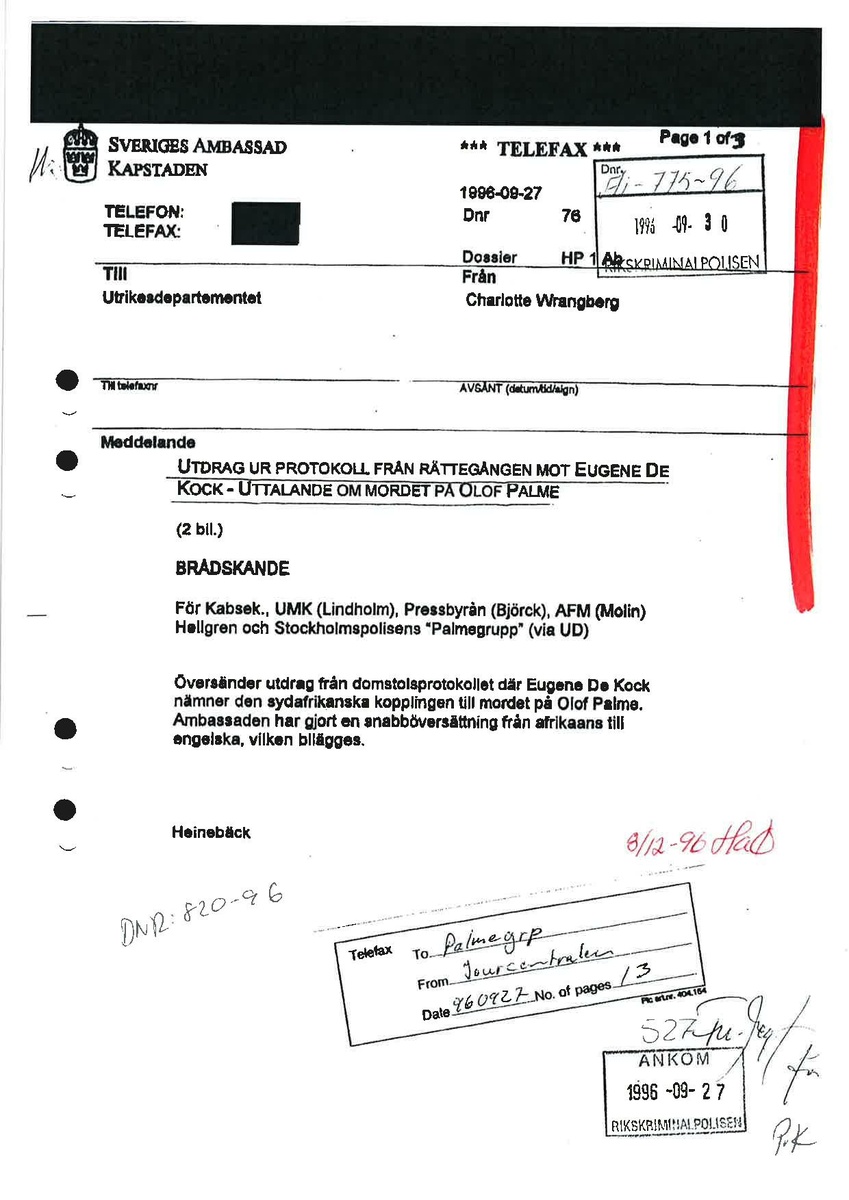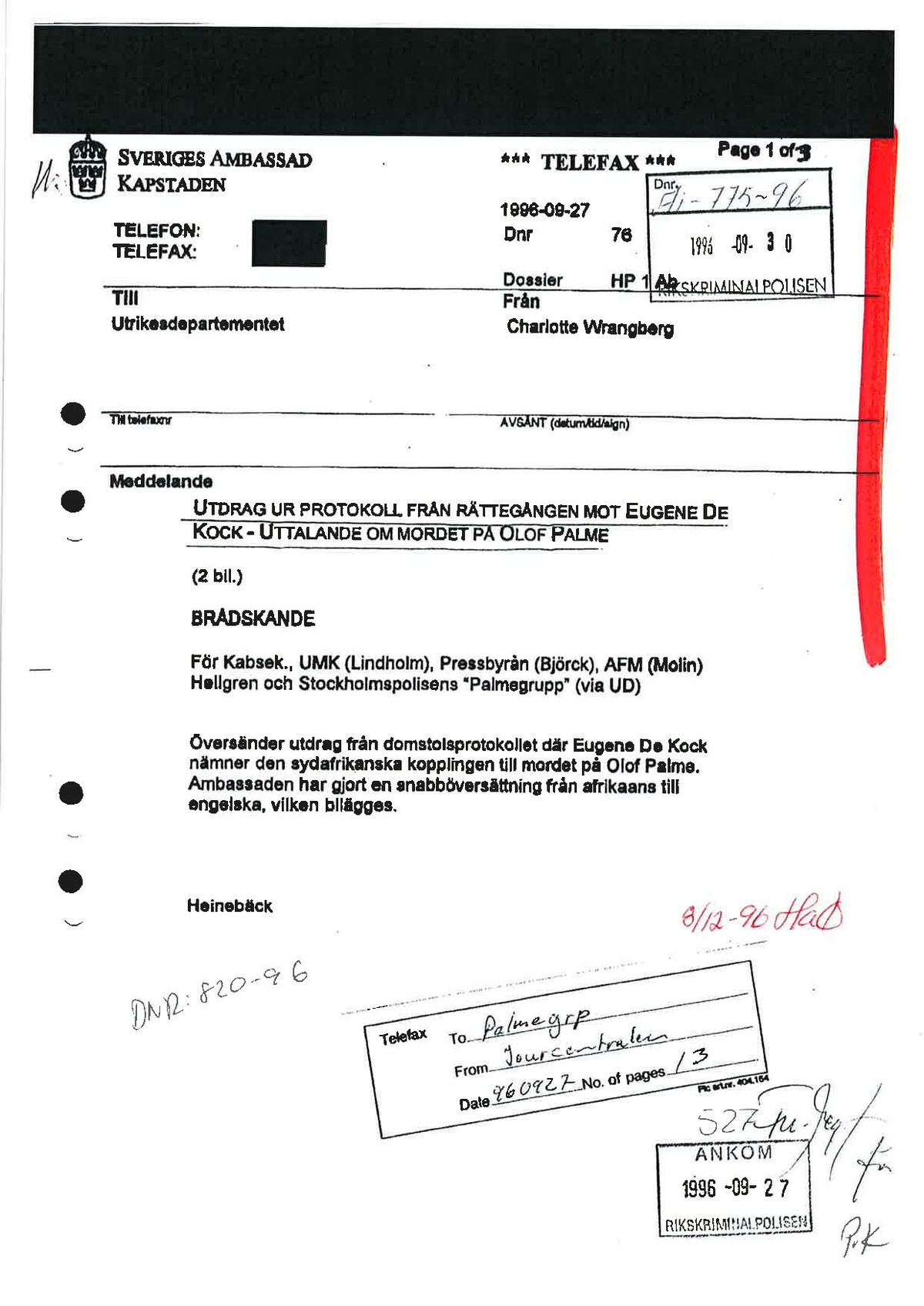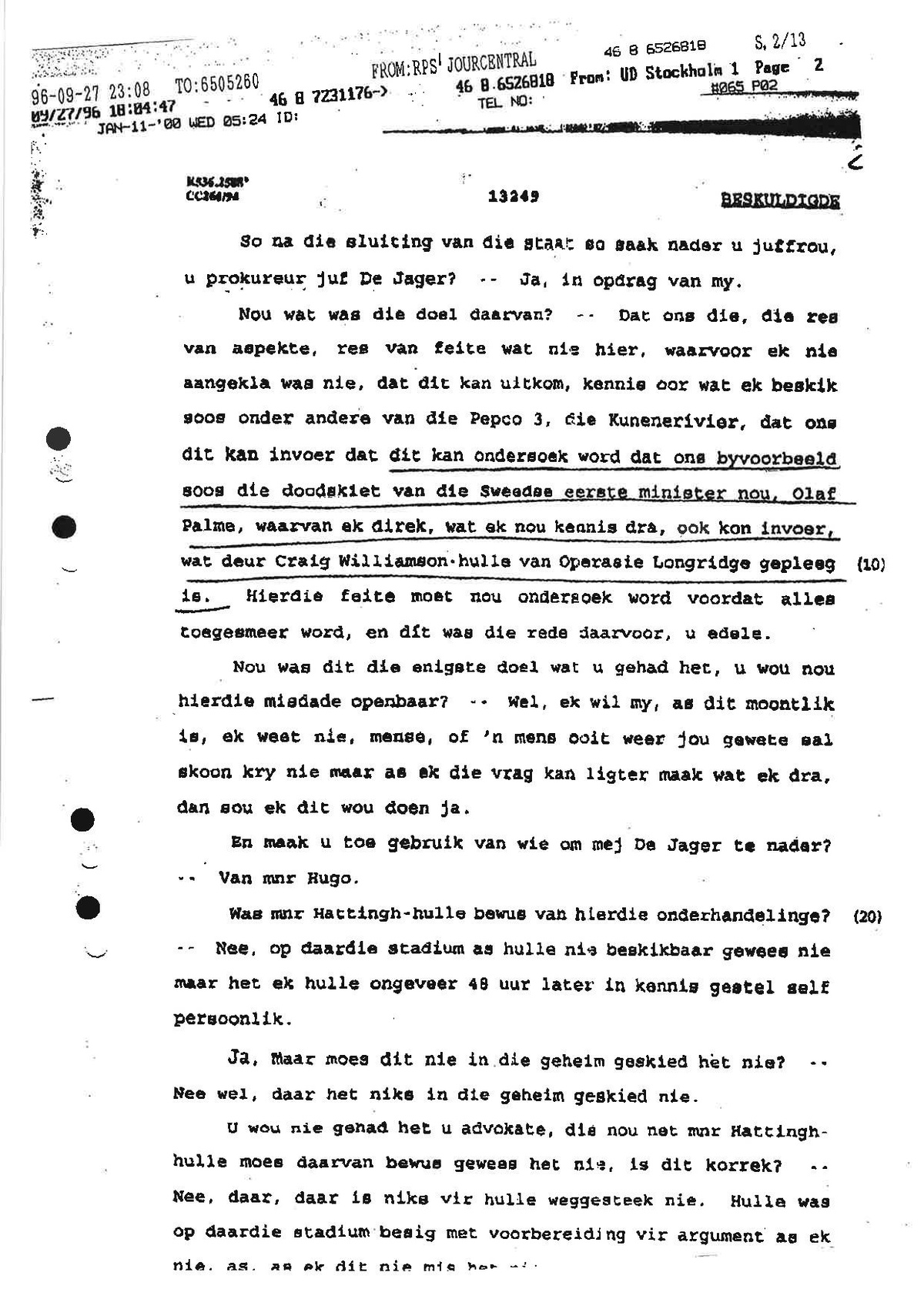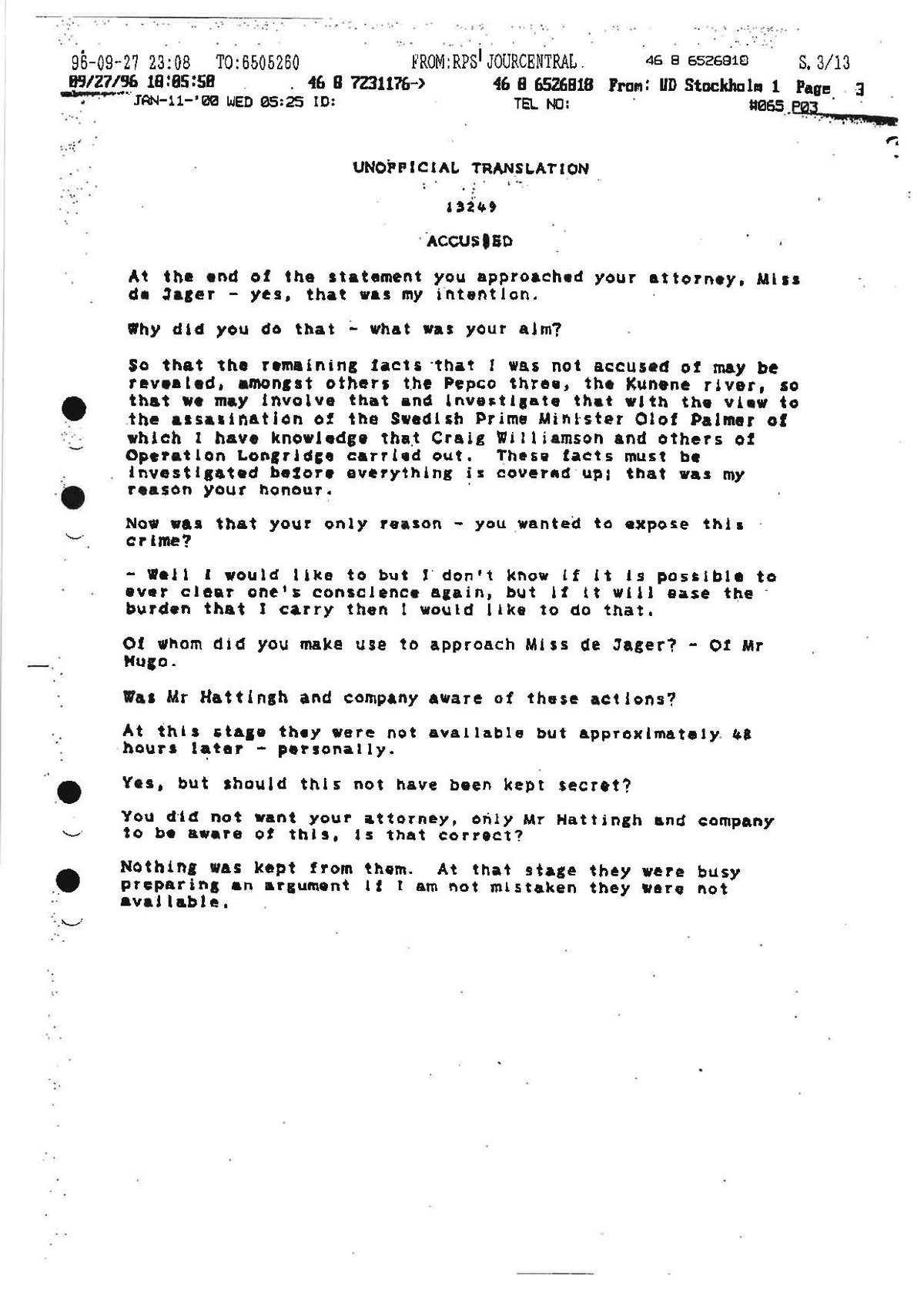- *** TELEFAX *** Page 1 of 3
SVERIGES AMBASSAD
KAPSTADEN
TELEFON:
TELEFAX:
1996-09-27
Dnr: 76
Dossier HP 1 Ab
Till: Utrikesdepartementet
Från Charlotte Wrangborg
Meddelande
UTDRAG UR PROTOKOLL FRÅN RÄTTEGÅNGEN MOT EUGENE DE KOCK - UTTALANDE OM MORDET PÅ OLOF PALME
(2 bil.)
BRÅDSKANDE
För
- Kabinettsekreterare, (Jan Eliasson)
- UMK (Lindholm),
- Pressbyrån (Björck),
- AFM (Molin) Hellgren och
- Stockholmspolisens "Palmegrupp" (via UD)
Översänder utdrag från domstolsprotokollet där Eugene De Kock nämner den sydafrikanska kopplingen till mordet på Olof Palme.
Ambassaden har gjort en snabböversättning från afrikaans till engelska, vilken bilägges.
Bo Heinebäck
- *** TELEFAX *** Page 1 of 3
SVERIGES AMBASSAD
KAPSTADEN
TELEFON:
TELEFAX:
1996-09-27
Dnr: 76
Dossier HP 1 Ab
Till: Utrikesdepartementet
Från Charlotte Wrangborg
Meddelande
UTDRAG UR PROTOKOLL FRÅN RÄTTEGÅNGEN MOT EUGENE DE KOCK - UTTALANDE OM MORDET PÅ OLOF PALME
(2 bil.)
BRÅDSKANDE
För
- Kabinettsekreterare, (Jan Eliasson)
- UMK (Lindholm),
- Pressbyrån (Björck),
- AFM (Molin) Hellgren och
- Stockholmspolisens "Palmegrupp" (via UD)
Översänder utdrag från domstolsprotokollet där Eugene De Kock nämner den sydafrikanska kopplingen till mordet på Olof Palme.
Ambassaden har gjort en snabböversättning från afrikaans till engelska, vilken bilägges.
Bo Heinebäck
- 13249
BESKULDIGDE
FHL: So na die sluiting van die staat so saak nader u juffrou,
u prokureur juf De Jager?
Eugene de Kock: Ja, in opdrag van my.
FHL: Nou wat was die doel daarvan?
Eugene de Kock: Dat ons die, die res van aspekte, res van feite wat nie hier, waarvoor ek nie aangekla was nie, dat dit kan uitkom, kennis oor wat ek beskik soos onder andere van die Pepco 3, die Kunenerivier, dat one dit kan invoer dat dit kan ondersoek word dat ons byvoorbeeld soos die doodskiet van die Sweedse eerste minister nou, Olaf Palme , waarvan ak direk, wat ek nou kennis dra, ook kon invoer, wat deur Craig Williamson hulle van Operasie Longridge (Operation Longreach) gepleeg is.(10)
Eugene de Kock: Hierdie feite moet nou ondersoek word voordat alles toegesmeer word, en dit was die rede daarvoor, u edele.
FHL: Nou was dit die enigste doel wat u gehad hec, u wou nou hierdie misdade openbaar?
Eugene de Kock: Wel, ek wil my, as dit moontlik is, ek weet nie, mense, of 'n mens ooit weer jou gewete sal skoon kry nie maar as ek die vrag kan ligter maak wat ek dra, dan sou ek dit wou doen ja.
FHL: En maak u toe gebruik van wie om mej De Jager te nadar?
Eugene de Kock: Van mnr Hugo.
FHL: Was mnr Hattingh-hulle bewus van hierdie onderhandelinge? (20)
Eugene de Kock: Nee, op daardie stadium as hulle nie beskikbaar gewees nie maar het ek hulle ongeveer 48 uur later in kennis gestel self persoonlik.
FHL: Ja, maar moes dit nie in die geheim geskied het nie? Nee wel, daar het nike in die geheim geskied nie.
U wou nie gehad het u advokate, die nou net mnr Hattingh-hulle moes daarvan bewus geweas het nie, is dit korrek?
Eugene de Kock: Nee, daar, daar is niks vir hulle weggesteek nie.
Hulle was op dardie stadium besig met voorbereiding vir argument as ek nie,as, as ek dit nie mis (oläsligt)
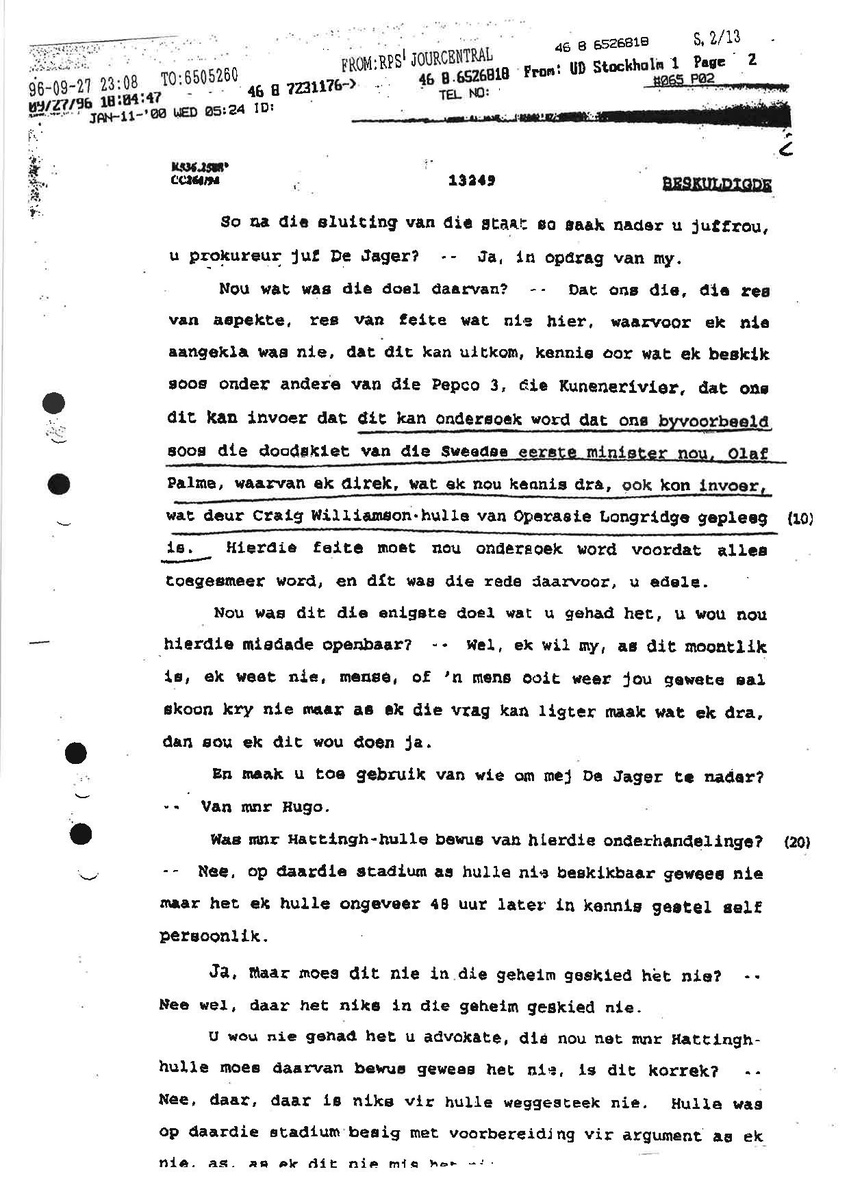
- 13249
BESKULDIGDE
FHL: So na die sluiting van die staat so saak nader u juffrou,
u prokureur juf De Jager?
Eugene de Kock: Ja, in opdrag van my.
FHL: Nou wat was die doel daarvan?
Eugene de Kock: Dat ons die, die res van aspekte, res van feite wat nie hier, waarvoor ek nie aangekla was nie, dat dit kan uitkom, kennis oor wat ek beskik soos onder andere van die Pepco 3, die Kunenerivier, dat one dit kan invoer dat dit kan ondersoek word dat ons byvoorbeeld soos die doodskiet van die Sweedse eerste minister nou, Olaf Palme , waarvan ak direk, wat ek nou kennis dra, ook kon invoer, wat deur Craig Williamson hulle van Operasie Longridge (Operation Longreach) gepleeg is.(10)
Eugene de Kock: Hierdie feite moet nou ondersoek word voordat alles toegesmeer word, en dit was die rede daarvoor, u edele.
FHL: Nou was dit die enigste doel wat u gehad hec, u wou nou hierdie misdade openbaar?
Eugene de Kock: Wel, ek wil my, as dit moontlik is, ek weet nie, mense, of 'n mens ooit weer jou gewete sal skoon kry nie maar as ek die vrag kan ligter maak wat ek dra, dan sou ek dit wou doen ja.
FHL: En maak u toe gebruik van wie om mej De Jager te nadar?
Eugene de Kock: Van mnr Hugo.
FHL: Was mnr Hattingh-hulle bewus van hierdie onderhandelinge? (20)
Eugene de Kock: Nee, op daardie stadium as hulle nie beskikbaar gewees nie maar het ek hulle ongeveer 48 uur later in kennis gestel self persoonlik.
FHL: Ja, maar moes dit nie in die geheim geskied het nie? Nee wel, daar het nike in die geheim geskied nie.
U wou nie gehad het u advokate, die nou net mnr Hattingh-hulle moes daarvan bewus geweas het nie, is dit korrek?
Eugene de Kock: Nee, daar, daar is niks vir hulle weggesteek nie.
Hulle was op dardie stadium besig met voorbereiding vir argument as ek nie,as, as ek dit nie mis (oläsligt)
- UNOFFICIAL TRANSLATION
- 13249
- ACCUSED
FHL: At the end of the statement you approached your attorney, Miss de Jager.
Eugene de Kock: Yes, that was my intention.
FHL: Why did you do that - what was your aim?
Eugene de Kock : So that the remaining facts that I was not accused of may be revealed, amongst others the Pepco three, the Kunene river, so that we may involve that and investigate that with the view to the assassination of the Swedish Prime Minister Olof Palme of which I have knowledge that Craig Williamson and others of Operation Longridge (Operation Longreach) carried out. These facts must be investigated before everything is covered up; that was my reason your honour.
FHL: Now was that your only reason - you wanted to expose this crime?
Eugene de Kock : - Well I would like to, but I don't know if it is possible to ever clear one's conscience again, but if it will ease the burden that I carry then I would like to do that.
FHL: Of whom did you make use to approach Miss de Jager?
Eugene de Kock : Of Mr Hugo.
FHL: Was Mr Hattingh and company aware of these actions?
Eugene de Kock : At this stage they were not available but approximately 48 hours later- personally.
FHL: Yes, but should this not have been kept secret?
You did not want your attorney, only Mr Hattingh and company to be aware of this, is that correct?
Eugene de Kock : Nothing was kept from them. At that stage they were busy preparing an argument if I am not mistaken they vare not available.
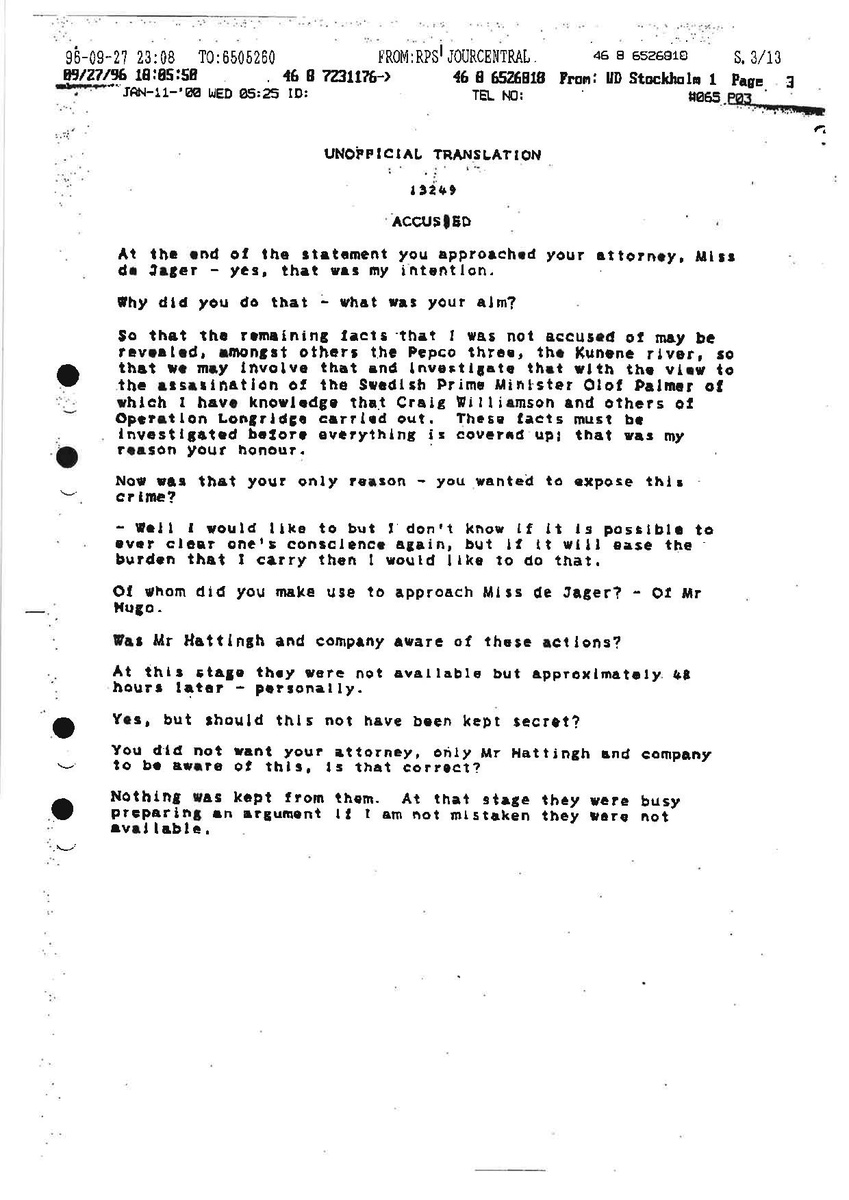
- UNOFFICIAL TRANSLATION
- 13249
- ACCUSED
FHL: At the end of the statement you approached your attorney, Miss de Jager.
Eugene de Kock: Yes, that was my intention.
FHL: Why did you do that - what was your aim?
Eugene de Kock : So that the remaining facts that I was not accused of may be revealed, amongst others the Pepco three, the Kunene river, so that we may involve that and investigate that with the view to the assassination of the Swedish Prime Minister Olof Palme of which I have knowledge that Craig Williamson and others of Operation Longridge (Operation Longreach) carried out. These facts must be investigated before everything is covered up; that was my reason your honour.
FHL: Now was that your only reason - you wanted to expose this crime?
Eugene de Kock : - Well I would like to, but I don't know if it is possible to ever clear one's conscience again, but if it will ease the burden that I carry then I would like to do that.
FHL: Of whom did you make use to approach Miss de Jager?
Eugene de Kock : Of Mr Hugo.
FHL: Was Mr Hattingh and company aware of these actions?
Eugene de Kock : At this stage they were not available but approximately 48 hours later- personally.
FHL: Yes, but should this not have been kept secret?
You did not want your attorney, only Mr Hattingh and company to be aware of this, is that correct?
Eugene de Kock : Nothing was kept from them. At that stage they were busy preparing an argument if I am not mistaken they vare not available.
